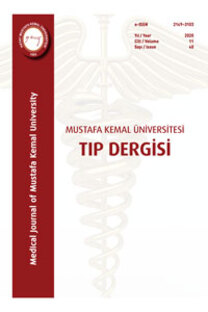Gaitada Gizli Kan Pozitifliği Nedeniyle Kolonoskopi Yapılanlarda Kolorektal Malignite Sıklığı
Gaitada gizli kan pozitifliği, Kolonoskopi, Tarama
Evaluation of Frequency of Malignancy in Patients Undergoing Colonoscopy Due to Fecal Occult Blood Positivity
Fecal occult blood positivity, Colonoscopy, Screening,
___
- Maida M, Macaluso FS, Ianiro G, et al. Screening of colorectal cancer: present and future. Expert Rev Anticancer Ther 2017;17:1131- 46.
- Kanser-istatistikleri docx doc. Erişim www.saglik.gov.tr.
- Kolorektal Kanser Taramaları http://kanser.gov.tr/ Dosya/tarama/kolorektal kanser tarama programi.pdf.
- Surveillance, Epidemiology and End Results (SEER) Program SEER*Stat Database: NAACCR Incidence – CiNA Analytic File, 1995-2010, for Expanded Races, Custom File With County, ACS Facts and Figures projection Project, North American Association of Central Cancer Registries, 2013. http://uacc.arizona.edu/sites/default/files/acs 2012.
- Bretthauer M. Evidence for colorectal cancer screening. Best Pract Res Clin Anaesthesiol. 2010;24(4):417-25. PMID: 20833346. https://doi.org/10.1016/j.bpg.2010.06.005.
- Lieberman DA. Clinical practice. Screening for colorectal cancer. N Engl J Med 2009;361:1179-87.
- Jass JR. Classification of colorectal cancer based on correlation of clinical, morphological and molecular features. Histopathology 2007; 50: 113– 30.
- Brenner H, Hoffmeister M, Stegmaier C, Brenner G, Altenhofen L, Haug U. Risk of progression of advanced adenomas to colorectal cancer by age and sex: estimates based on 840,149 screening colonoscopies. Gut 2007; 56: 1585– 9.
- Muto T, Bussey HJ, Morson BC. The evolution of cancer of the colon and rectum. Cancer 1975;36: 2251– 70.
- Doubeni CA, Weinmann S, Adams K, et al. Screening colonoscopy and risk for incident late‐stage colorectal cancer diagnosis in average‐risk adults: a nested case‐control study. Ann Intern Med 2013; 158( 5 Pt 1): 312– 20.
- Brenner H, Chang‐Claude J, Jansen L, Knebel P, Stock C, Hoffmeister M. Reduced risk of colorectal cancer up to 10 years after screening, surveillance, or diagnostic colonoscopy. Gastroenterology 2014; 146: 709– 17.
- Nishihara R, Wu K, Lochhead P, et al. Long‐term colorectal‐cancer incidence and mortality after lower endoscopy. N Engl J Med 2013; 369: 1095– 105.
- Yang H, Ge Z, Dai J, et al. Effectiveness of the immunofecal occult blood test for colorectal cancer screening in a large population. Dig Dis Sci 2011;56:203-7.
- Bjerrum A, Andersen O, Fischer A, et al. Long-term risk of colorectal cancer after negative colonoscopy in a Danish gFOBT screening cohort. Int J Cancer 2017;141:503-11.
- Paimela H, Malila N, Palva T, Hakulinen T, Vertio H, Jarvinen H. Early detection of colorectal cancer with faecal occult blood test screening. Br J Surg 2010;97:1567-71.
- Quyn AJ, Fraser CG, Stanners G, Carey FA, Rees CJ, Moores B, et al. Scottish Bowel Screening Programme colonoscopy quality - scope for improvement? Colorectal Dis. 2018 Sep;20(9):O277-O283. https://doi.org/10.1111/codi.14281.
- Özlem Gül UTKU, Bilal ERGÜL, Dilek OĞUZ. Gaitada gizli kan testi pozitifliği nedeni ile kolonoskopi yapılan hastaların kolonoskopik ve patolojik sonuçlarının değerlendirilmesi. Akademik Gastroenteroloji Dergisi 2018; 17 (1) : 17-20.
- Mayir B, Ensari CÖ, Durhan A, Çöpelci Y. Kolorektal kanser tarama amaçlı yapılan gaytada gizli kan testi pozitif saptanan hastalarda kolonoskopi bulguları. Turk J Colorectal Dis. 2018;28:27-30.
- Yasin Kara, İnanç Şamil Sarıcı, Mustafa Uygar Kalaycı. Bölgemizde Yürütülen Kolon Kanser Tarama Programının Etkinliğinin Değerlendirilmesi. İKSSTD 2019;11(1):31-36 https://doi.org/10.5222/iksstd.2019.52523.
- Stryker SJ, Wolff BG, Culp CE, Libbe SD, Ilstrup DM, MacCarty RL. Natural history of untreated colonic polyps. Gastroenterology. 1987;93(5): 1009-1013 https://doi.org/10.1016/0016-5085(87)90563-4.
- Winawer SJ, Zauber AG. The advanced adenoma as the primary target of screening. Gastrointest Endosc Clin N Am. 2002;12: 1-9, v. https://www.ncbi.nlm.nih.gov/ pubmed/11916153 PMID:11916153
- F. G. J. Kallenberg, J. L. A. Vleugels, T. R. de Wijkerslooth, et al. Adding family history to faecal immunochemical testing increases the detection of advanced neoplasia in a colorectal cancer screening programme. Aliment Pharmacol Ther2016;44:88–96.
- Anath A Flugelman, Nili Stein, Ori Segol, Idit Lavi and Lital Keinan-Boker. Delayed Colonoscopy Following a Positive Fecal Test Result and Cancer Mortality. JNCI Cancer Spectrum (2019) 3(2): pkz024. https://doi.org/10.1093/jncics/pkz024.
- ISSN: 2149-3103
- Yayın Aralığı: Yılda 3 Sayı
- Başlangıç: 2010
- Yayıncı: Hatay Mustafa Kemal Üniversitesi Tıp Fakültesi Dekanlığı
Hüseyin Avni DEMİR, Fikret BİLDİK, Tülin GESOĞLU DEMİR, Dikmen ÇALIŞKAN, Reyhan ŞAHNAOĞLU, Ekim Özge GÖKÇE
Kronik İshalin Nadir Bir Sebebi: Eozinofilik Kolit
Sezeryan Sonrası Görülen Nadir Bir Komplikasyon: Vezikouterin Fistül
Eser ÖRDEK, Eyyup Sabri PELİT, BÜLENT KATI
Bulantı ve Kusma ile Kendini Gösteren İki Rabdomiyoliz Vakası
Zeki KEMEÇ, Selçuk AKIN, Mehmet Mahfuz ŞIKGENÇ
Erman ALTUNIŞIK, Ali Zeynel ABİDİN TAK
Özgür ÇAĞLAR, Erdem KARADENİZ, Müfide Nuran AKCAY, Kamber KAŞALİ
Prostat Karsinomunun Moleküler Yolakları
Gaitada Gizli Kan Pozitifliği Nedeniyle Kolonoskopi Yapılanlarda Kolorektal Malignite Sıklığı
Mustafa Zanyar AKKUZU, Orhan SEZGİN, Enver ÜÇBİLEK, Osman ÖZDOĞAN, Ferzan AYDIN, Hatice RIZAOĞLU BALCI, Serkan YARAŞ, Fehmi ATEŞ, Engin ALTINTAŞ
Uzun Dönem Oral Antidiyabetik ve İnsülin Kullanımında Nöropatik Ağrı Seyrinin Karşılaştırılması
